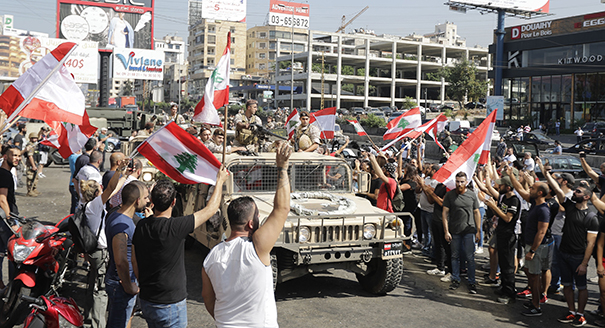In the past week, protests have erupted throughout Lebanon against financial measures planned by the government of Saad al-Hariri to address the country’s severe economic crisis. These measures would have included raising value-added taxes on the Lebanese, as well as a particularly unpopular fee imposed on internet telephone calls. It quickly became evident, however, that the motivation for the protests ran much deeper and reflected profound hostility to the political class in general, which is perceived as corrupt and ineffective. To examine the implications of the protests, Diwan spoke to Carnegie nonresident scholar Joseph Bahout, who has followed the events closely.
Michael Young: On Monday, Prime Minister Saad al-Hariri announced economic measures to alleviate the severity of Lebanon’s economic and financial crisis. What will be the impact of this?
Joseph Bahout: After a 72-hour interregnum once the protests began, Hariri presented his reform road map last Monday. If we examine it closely we can see that it is a set of disparate measures that offers no real perspective for the structural economic changes that are required to avoid an economic collapse. What we saw, instead, appeared to be simply an effort to buy time.
Some of these measures were cosmetic, designed to achieve a populist aim—for example slashing the salaries of ministers and parliamentarians. Some were long overdue, but their implementation will require a radical change in behavior by the government, for example with regard to management of the electricity sector. And some are potentiality divisive for the government, such as the move to raise taxes on banks’ profits, which could provoke financial panic that would exacerbate the crisis.
The protest movement quickly rejected Hariri’s plan and escalated its demands. These include the government’s resignation, the formation of a new government of apolitical technocrats, a new electoral law and new elections, in addition to a profound change in the government’s management of the economy. However, the protest movement is not organized and in time it risks exhaustion or division. This is what the government is wagering on to survive.
MY: What are the possible outcomes in the coming period?
JB: Within the government there are already serious divisions, and they will widen further from now on. Paradoxically, after the protests Hariri should be more conscious of the leverage he has to effect change in financial and economic policy. President Michel Aoun and Hezbollah need for him to remain in office as he is the favored interlocutor of the international community and donors. However, Hariri also lacks allies inside his government, especially after the resignation of ministers from the Lebanese Forces. At the same time, Aoun and Hezbollah remain unwilling to concede any real decisionmaking power to the prime minister, even though the reaction from the street should have frightened them and undermined the aura of power they seemed to enjoy.
If the reform measures prove insufficient and if the protest movement remains resilient, we should expect a prolonged stalemate. This will probably increase the risks of more violent incidents. The same kind of risk is to be expected if Hariri were to resign. This would most probably lead to a prolonged vacuum in the government, with the ensuing negative repercussions for the economy. Of course, another alternative could then be the formation of a government by Aoun, Hezbollah, and their allies. However, this would set Lebanon on a collision course with a large number of its international partners.
The only organized political forces able to exploit the scenarios I’ve laid out are Hezbollah and the Lebanese armed forces. This explains the persistence of a tenacious rumor now circulating in Beirut about a potential role for the military in resolving the crisis, a demand articulated even by some protesters. Indeed, the military’s behavior is now being closely scrutinized by protesters, if only so that soldiers might act as a shield against political forces opposed to the protests who are loyal to senior government officials; or, eventually, to protect a “national salvation” government that might be responsible for a political transition, if one is feasible.
MY: How willing is the military to cross the line and seek a confrontation, even a soft one, with Hezbollah?
JB: In the past two days the army prevented attacks against the protesters by followers of Parliament Speaker Nabih Berri’s Amal Movement and some Hezbollah vigilantes. Prior to that, Hariri had vowed to protect the protesters and the military command had also warned that it would not tolerate any aggression against the protest movement (especially after Amal thugs used weapons to try to suppress protests in Shi‘a strongholds last weekend). The army acted firmly and Amal ordered its militants to withdraw from the streets.
Such developments raised several questions. Hezbollah is widely believed to have considerable influence over the armed forces, even infiltrating the institution. Did something change lately? If not, then what are the limits to this new behavior by the military? And if yes, will Hezbollah momentarily heed the army’s warnings in order to weather the current storm?
Also, the dynamics between the military and Michel Aoun has to be monitored as well. The armed forces commander, General Joseph Aoun, was picked by the president, but he is also known to have very poor relations with his son in law, Foreign Minister Gebran Bassil. Moreover, both are regarded as rival presidential hopefuls to succeed the aging Michel Aoun.
After several days of protests all over Lebanon, the two figures who have been most insulted by demonstrators have been Bassil and Berri. Even Hassan Nasrallah, Hezbollah’s secretary general, has not been spared. Such dynamics will shape the evolution, options, and prospects of the protest movement down the road.










